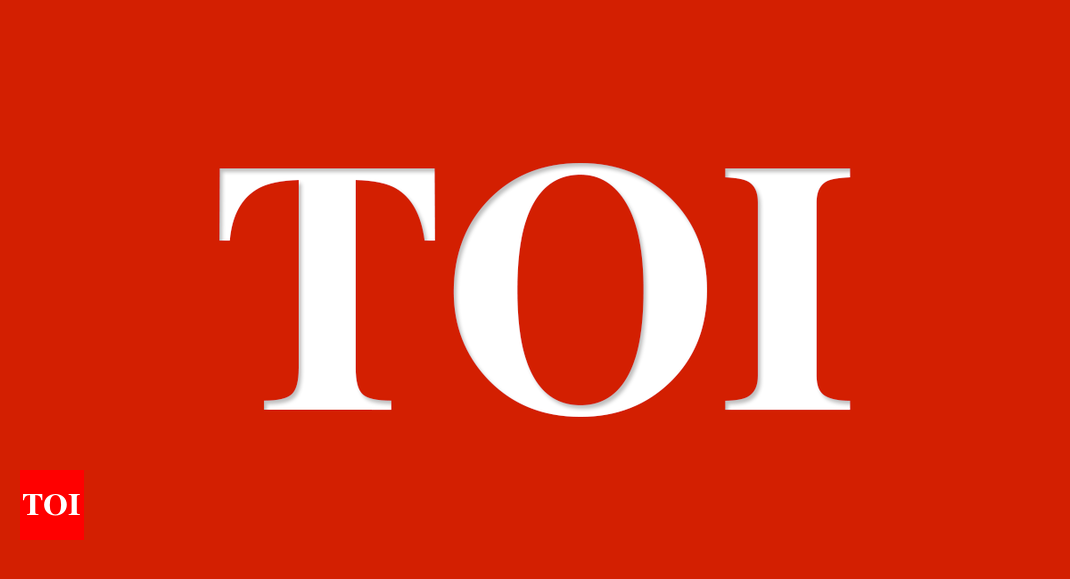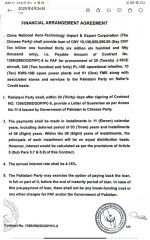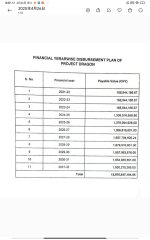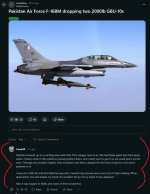ZDK03 is indeed relatively old, still using the early PD radar, but do not consider the so-called LINK17, when the JF17 and J10C directly installed PLA data link can be, anyway, the wartime F16 and Saab early warning aircraft are difficult to supplement consumablesWe don't need the link 16. And doesn't the jf-17 use link 17? From what I've read the Chinese don't have the link 17's installed on the j-35 and j-10(as it's a Pakistani system). So it would be interesting how you can create a combat system with the j-10 and j-35, when the jf-17 is more integrated with the Swedish erieyes than the zdk chinese junk awacs.
Pakistan AirForce : Updates & Discussions
- Thread starter Ashwin
- Start date
You are using an out of date browser. It may not display this or other websites correctly.
You should upgrade or use an alternative browser.
You should upgrade or use an alternative browser.
Lost all respect for them(if I'd any), when they gave awards to their pilot(s) for falsely shooting an MKI. Which professional force will do that?
Bunch of delusional thugsLost all respect for them(if I'd any), when they gave awards to their pilot(s) for falsely shooting an MKI. Which professional force will do that?
Lost all respect for them(if I'd any), when they gave awards to their pilot(s) for falsely shooting an MKI. Which professional force will do that?
They even have a national holiday celebrating their 1965 loss.

Defence Day - Wikipedia
Let Abhinandan speak publicly on what happened on that day. su30MKI shooting drama & our narration of f16 shooting down, both have no merit.Lost all respect for them(if I'd any), when they gave awards to their pilot(s) for falsely shooting an MKI. Which professional force will do that?
I think instead of giving podcasts, Modiji should put up pictures of some good Pakistani women near his working table and work harder day and night and do some invasions. Unlike Bangladesh or China or Lanka, some good quality ROI is there inside Pakistan. Nowhere it is written we cannot invade Pakistan.
Mirage V ROSE crashed
Terrible numbers !
How will a long drawn out CAPs effect the life of AAMs of both India and Pak, we know AMRAAM has higher lifetime on active usage on pylon than R-77, but even assuming Astra has just more life on pylon than R-77, the fact that we can make more Astra bvrs should be helpful.
Pak has 500 odd AMRAAM C-5s that they have bought and latest one should already be more than 14 years old, so has any mid life refurbishment been done by Raytheon on these AMRAAMs?, can anyone find press release of the same?
The delivery of the missiles is expected to start in 2008 and go through until 2011. Last June, the Pentagon announced a major package for Islamabad under the Foreign Military Sales Programme that included 60 F-16 Mid-Life Update Modification Kits.

Pakistan to buy 700 air-to-air missiles from US - Times of India
US News: Pakistan is procuring 500 Advanced AMRAAM and 200 Sidewinder missiles from America.
Pakistan Air Force is not important, China can provide Pakistan with at least 200 J-10B/C at any time,How will a long drawn out CAPs effect the life of AAMs of both India and Pak, we know AMRAAM has higher lifetime on active usage on pylon than R-77, but even assuming Astra has just more life on pylon than R-77, the fact that we can make more Astra bvrs should be helpful.
Pak has 500 odd AMRAAM C-5s that they have bought and latest one should already be more than 14 years old, so has any mid life refurbishment been done by Raytheon on these AMRAAMs?, can anyone find press release of the same?

Pakistan to buy 700 air-to-air missiles from US - Times of India
US News: Pakistan is procuring 500 Advanced AMRAAM and 200 Sidewinder missiles from America.timesofindia.indiatimes.com
The question now is whether the Pakistani Army can use modern land warfare after the Russo-Ukrainian war.
where will they get 200 pilots for J-10s, will PLAAF fly them too?Pakistan Air Force is not important, China can provide Pakistan with at least 200 J-10B/C at any time,
The question now is whether the Pakistani Army can use modern land warfare after the Russo-Ukrainian war.
Are you also offering to upgrade that order to a meal with fries and a regular drink for an extra $3.99? Since its looking more like a fast food order than a serious defense deal?Pakistan Air Force is not important, China can provide Pakistan with at least 200 J-10B/C at any time,
The question now is whether the Pakistani Army can use modern land warfare after the Russo-Ukrainian war.
Where do you get trained pilots, support staff, infra to maintain these planes ?
Also if India starts sending 155mm shells to the Republic of China supporting them against the renegade forces on the mainland then ??
China is no US, they wont provide free lunch. Even the VT4s were paid by Saudis as said by one Pak member who knows more on armored stuff in old PDF, and apparently even J-10s initial payment came from gulf and rest is loan, with all these arrangements PAF bought just 20 odd J-10s but they will absorb 200 J-10s suddenlyAre you also offering to upgrade that order to a meal with fries and a regular drink for an extra $3.99? Since its looking more like a fast food order than a serious defense deal?
Where do you get trained pilots, support staff, infra to maintain these planes ?
Also if India starts sending 155mm shells to the Republic of China supporting them against the renegade forces on the mainland then ??

And btw this is not something new for pak,
around 1970s after Yom-Kippur war, mohemmdan countries embargoed oil and jacked up prices, India was under serious strain at that time, while Pak was getting half a billion dollar aid in just one year, in present rate that equals 6billion USD, and if you compare the aid as percent of percapita income it will be even more aid required in present day, like $7 bump at a percapita lf $110 in 1975, is like 6% bump in percapita income just because of aid, if similar percent in pakistan percapita has to occur in 2025 withe a percapita of ~$1600, it requires a $100 bump percapita and for the population of 240 million, it gives 24 Billion USD of aid in just a year.
By Eric Pace Special to The New York Times
Aug. 17, 1975
Pakistan Is Bolstered by Aid From Other Moslem Nations
ISLAMABAD, Pakistan —The learning of Arabic is being encouraged in Pakistan. Editions of the Koran marred by typographical errors are barred from bookshops. Airline employes, announcing flight plans, stipulate, “If Allah wills.”
Such devotion to the faith and culture of Islam is earning Pakistan rich rewards: During the 12 months ending June 30 other Moslem countries gave her more than $500‐million in aid from their oil profits.
That is the equivalent of more than $7 for each Pakistani, a great boon in a country whose per capita income is put at $80 to $110 a year.
The effect of the aid, along with assistance from the United States and other sources, has been to cushion the impact of the rising prices Pakistan must pay for oil and other imports, of her runaway population growth and of the global economic doldrums.
The money has helped to keep Pakistan far better off economically than floundering India and has made it easier for her to indulge in little luxuries such as the 10 Mirage reconnaissance jet, planes that she ordered from France last month in a $75‐million deferred‐payment deal.
The close ties with other Islamic states were reflected in a typical recent message, beginning “excellency and dear brother,” that Prime Minister Zulfikar Ali Bhutto addressed to President Anwar el‐Sadat of Egypt, with greetings to “the fraternal Egyptian people” and a denunciation of “Zionist aggression.”
Economically troubled Egypt was not among Pakistan's benefactors, but her stanch and open handed supporter, Saudi Arabia, was, to the tune of $35‐million in credits. Libya lent Pakistan $97‐million, Abu Dhabi $108‐million, Qatar $11‐million and Kuwait $5‐million.
A further $251‐million came from Iran, the Moslem but nonArab nation that adjoins Pakistan on the west and which, like Pakistan, has been stressing Islamic solidarity and ties with the Arab world.
All the loans are at low interest rates, to be paid in eight to 40 years.
Though many Pakistanis see the aid from the oil‐producing nations as a natural outgrowth of Islamic ties, such aid was relatively scant before the impact of the price rises that began late in 1973, before Mr. Bhutto began stressing those ties.
Under the military regime that preceded Mr. Bhutto, an official observed, “there was a sort of cultural gap—the force that Islam represents was not fully perceived.”
Nowadays Prime Minister Bhutto takes pains over such matters as the naming of ambassadors to key Moslem nations. High‐level contacts with Islamic leaders have become frequent, notably at the Islamic conference held in Pakistan in February, 1974. At that conference Mr. Bhutto, stressing Pakistan's common cause with the Arabs, said the Israelis were “intoxicated with their militarism and reeking with ethnological arrogance.”
Pakistan makes other gestures of solidarity with the Arabs. The Pakistani press, which is responsive to the Government's views, has endorsed recent Arab criticism of Israel's administration of the tomb of Abraham at Hebron, on the Israeli‐occupied West Bank of the Jordan River.
“There seems to be no end to Israeli vandalism and the Zionist state's persistence in taking step after step deliberately aimed at causing grave provocation to the entire Moslem world,” the Karachi Morning News said in an editorial a day after Moslem worshipers rioted at the tomb to protest an Israeli proposal to divide it between Jews and Moslems.
Pakistani officials are also at pains to stress their cultural links with Iran. Persian poets such as Omar Khayyam are quoted and revered. The Prime Minister, on a recent visit to Iran, so admired an ornate gate that he is having one like it put up to adorn a Moslem shrine. In June the two nations signed a voluminous cultural‐exchange agreement.
In addition strategic interests underlie Iran's support for Pakistan: The Shah of Iran feels uncomfortable surrounded by the Soviet Union on the north, Soviet‐influenced Arab nations on the west and Soviet‐armed Afghanistan on the east. Accordingly, Iran has buttressed her other eastern neighbor, Pakistan, which has close ties with China.
The relatively liberal Pakistani élite sees no conflict between the Government's ties with China's secular, anticlerical regime and the grass‐roots Moslem faith of the Pakistani populace.
It was taken for granted that the Minister of State for Railways, Mian Muhammad Atta Ullah, should make a speech here saying that it was the duty of every Pakistani Moslem to learn Arabic to be able to read the Koran.
The Ministry of Religious Affairs reported that the sale of four editions of the Koran had been banned under a 1974 law after they had been found to contain numerous typographical errors. Legal proceedings are expected to be brought against a luckless Lahore concern that recently brought out a Koran containing 340 errors.
Last edited:
J10C and JF17 fighters are manufactured by Chengdu AVIC, and their operation methods are basically the same. Most Pakistani pilots can fly J10C after simple training.Are you also offering to upgrade that order to a meal with fries and a regular drink for an extra $3.99? Since its looking more like a fast food order than a serious defense deal?
Where do you get trained pilots, support staff, infra to maintain these planes ?
Also if India starts sending 155mm shells to the Republic of China supporting them against the renegade forces on the mainland then ??
What Taiwan lacks is not 155mm shells. It has been stockpiling these since 1949. And the production capacity of Taiwan's 202 Factory is sufficient to meet Taiwan's needs. In fact, Taiwan does not attach importance to 155 artillery. They only have a few m109a5s and a large number of old m109a2s. Most of Taiwan's infantry brigades are still using M114s. Taiwan believes that traditional howitzers will hardly survive in war.
Obviously the Pakistani is talking nonsense. Pakistan announced the details of the J-10C deal a long time ago. It borrowed 10.1 billion RMB from China with an annual interest rate of 4.15%.China is no US, they wont provide free lunch. Even the VT4s were paid by Saudis as said by one Pak member who knows more on armored stuff in old PDF, and apparently even J-10s initial payment came from gulf and rest is loan, with all these arrangements PAF bought just 20 odd J-10s but they will absorb 200 J-10s suddenly
And btw this is not something new for pak,
around 1970s after Yom-Kippur war, mohemmdan countries embargoed oil and jacked up prices, India was under serious strain at that time, while Pak was getting half a billion dollar aid in just one year, in present rate that equals 6billion USD, and if you compare the aid as percent of percapita income it will be even more aid required in present day, like $7 bump at a percapita lf $110 in 1975, is like 6% bump in percapita income just because of aid, if similar percent in pakistan percapita has to occur in 2025 withe a percapita of ~$1600, it requires a $100 bump percapita and for the population of 240 million, it gives 24 Billion USD of aid in just a year.



see the NYTimes article of 1975 I shared, how Pak paid French for Mirages which themselves were bought on deferred payment terms but they payed french with the help of mohammedan countries donating aid,Obviously the Pakistani is talking nonsense. Pakistan announced the details of the J-10C deal a long time ago. It borrowed 10.1 billion RMB from China with an annual interest rate of 4.15%.View attachment 42639View attachment 42640View attachment 42641
So what might have happened in the J10CE deal with PRC is, that the first installment might be provided by gulf countries, which might not even come under the agreement between Pak and PRC.
BTW, what about VT4s, do you have any info how they financed it?
And one more thing.Obviously the Pakistani is talking nonsense. Pakistan announced the details of the J-10C deal a long time ago. It borrowed 10.1 billion RMB from China with an annual interest rate of 4.15%.View attachment 42639View attachment 42640View attachment 42641
No, Pakistan has not announced the details of the J-10C deal, it was hacked by Indians and leaked
 . They were initially saying 36 J-10Cs were bought as a match for 36 Rafales, but once the leaks from our side happened it became clear they did not have much cash in kitty to order more.
. They were initially saying 36 J-10Cs were bought as a match for 36 Rafales, but once the leaks from our side happened it became clear they did not have much cash in kitty to order more.Pakistan is very secretive about these things, we generally hear from the vendor side more and they don't even release budget for deatiled analysis like this.
No country does that tho. No point in the history has a country provided such weaponry on such a large scale that too for cheap loans or some other compensations.Pakistan Air Force is not important, China can provide Pakistan with at least 200 J-10B/C at any time,
The question now is whether the Pakistani Army can use modern land warfare after the Russo-Ukrainian war.
Also even if somehow China does what you said then the negotiations, training time, deliveries, etc will take significant time.
J10C and JF17 fighters are manufactured by Chengdu AVIC, and their operation methods are basically the same. Most Pakistani pilots can fly J10C after simple training.
What Taiwan lacks is not 155mm shells. It has been stockpiling these since 1949. And the production capacity of Taiwan's 202 Factory is sufficient to meet Taiwan's needs. In fact, Taiwan does not attach importance to 155 artillery. They only have a few m109a5s and a large number of old m109a2s. Most of Taiwan's infantry brigades are still using M114s. Taiwan believes that traditional howitzers will hardly survive in war.
They miscalculated the need for an army, thinking defeating the PLAN before landfall will be sufficient. Now they have decided to focus on their army.
From where do the pilots will come, does Pakistan have trainer aircrafts to train the pilots in short period of time, what about the maintenance staff, and where gonna they keep it,Pakistan Air Force is not important, China can provide Pakistan with at least 200 J-10B/C at any time,
The question now is whether the Pakistani Army can use modern land warfare after the Russo-Ukrainian war.
Last year terrorist burned down their some of the aircrafts,
The question now is whether the pakistan airforce can protect thier airbase, do they have enough Sam, do their SAM have the ability to protect against missiles like pralaya, LR-ASHM, peshawar is 400 kilometres from international border, do they produce ammo for their SAM system, how many of their highways are upgrade for aircraft take-offs, Pakistan ain't Ukraine who can save their aircrafts from moving it further down, it won't take us long for us to Mass produce Long range pinakas, and the pinakas, and our automobile sectors also invested heavily in defence,
You guys also have to send them laser DEW system, more SAM & ammo, jammers, train them, fuel, given them billions of dollars, to fight the war,
Currently They are surviving on IMF and aids despite the Chinese loans,


